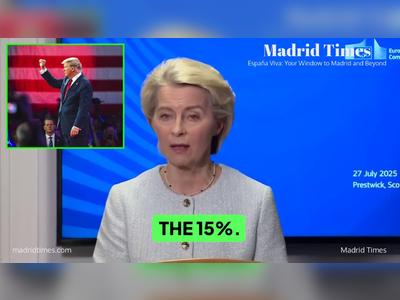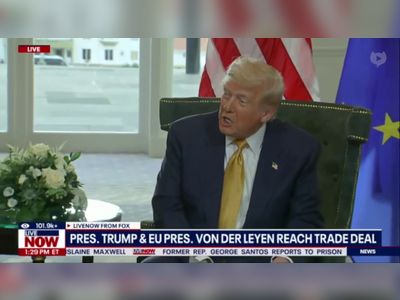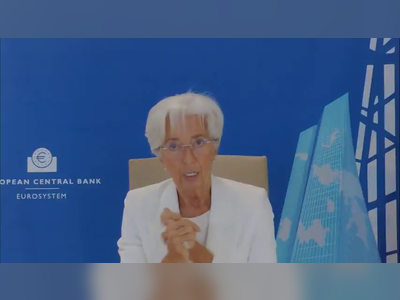Escalation in Israel-Iran Conflict Triggers Global Economic Repercussions
The recent Israeli strikes on Iranian targets lead to soaring oil prices, market volatility, and heightened geopolitical tensions.
Israeli airstrikes targeting multiple Iranian nuclear and military sites have sent significant shockwaves through the global economy.
Following the attacks, oil prices surged to their highest levels in months, while stock markets in the United States and Europe experienced steep declines.
In contrast, shares of defense firms saw an uptick, reflecting a shift in investor sentiment amid uncertainty.
Safe-haven assets, particularly US and German bonds, rallied as investors sought stability in the face of market turbulence.
Israeli Prime Minister Benjamin Netanyahu declared that the conflict would extend "for as many days as it takes," indicating a potential protracted engagement.
He also cautioned the Israeli population that they may need to prepare for extended periods of conflict.
The Iranian government condemned the strikes as a "declaration of war" and initiated a retaliatory response involving over 100 drones aimed at Israeli territory shortly thereafter.
Should the conflict continue, analysts predict that oil prices may remain elevated.
This could exacerbate the challenges faced by Europe’s energy-intensive industries and might revive inflationary pressures that had eased recently.
Carsten Brzeski, a macroeconomic expert, articulated concerns that a substantial escalation might lead to weakened consumer and business confidence throughout the Eurozone, further depressing already low demand and investment levels.
The potential for a return to stagflation—a situation marked by high inflation and low economic growth—looms as a significant concern.
Philipp Lausberg, a senior analyst, likened the current situation to the stagflation experienced in the aftermath of the Arab-Israeli Yom Kippur War in 1973. He noted that rising energy prices could necessitate interest rate hikes from the European Central Bank, which is already grappling with the dual challenge of fighting inflation without stifling economic growth.
In a scenario of nuclear escalation, experts have expressed concerns about the implications for broader regional stability.
Israel, known to maintain a nuclear arsenal since the 1960s, possesses an estimated 90 nuclear warheads but has not officially acknowledged these capabilities.
Susi Snyder, a nuclear policy expert, emphasized that while the risk of nuclear confrontation is not negligible, it remains relatively low under current circumstances.
Despite these tumultuous dynamics, the focus on potential disruptions to global supply chains has gained prominence.
The Strait of Hormuz, a crucial maritime route where about a quarter of the world’s oil passes, is now a focal area of concern.
Analysts suggest that while panic-buying reminiscent of the early COVID-19 pandemic is unlikely, the fragility of current supply chain systems could lead to significant economic disruptions.
European leaders have called for restraint on both sides following the Israeli airstrikes.
The E3 nations—France, Germany, and the UK—have voiced their concern regarding Iran’s nuclear ambitions in light of a recent resolution from the International Atomic Energy Agency (IAEA), which accused Iran of failing to meet its transparency commitments.
The conflict has progressed to such an extent that NATO Secretary-General remarked on the necessity for prompt diplomatic interventions to mitigate escalating tensions.
The United States has distanced itself from the recent military operations in Israel, asserting that it did not partake in the strikes, while also acknowledging the growing dangers posed by the current situation in the Middle East.
US intelligence assessments continue to suggest that Iran is not currently pursuing the development of a nuclear weapon.
Diplomatic talks regarding Iran's uranium enrichment are still set to take place, despite the prevailing tensions.
Following the attacks, oil prices surged to their highest levels in months, while stock markets in the United States and Europe experienced steep declines.
In contrast, shares of defense firms saw an uptick, reflecting a shift in investor sentiment amid uncertainty.
Safe-haven assets, particularly US and German bonds, rallied as investors sought stability in the face of market turbulence.
Israeli Prime Minister Benjamin Netanyahu declared that the conflict would extend "for as many days as it takes," indicating a potential protracted engagement.
He also cautioned the Israeli population that they may need to prepare for extended periods of conflict.
The Iranian government condemned the strikes as a "declaration of war" and initiated a retaliatory response involving over 100 drones aimed at Israeli territory shortly thereafter.
Should the conflict continue, analysts predict that oil prices may remain elevated.
This could exacerbate the challenges faced by Europe’s energy-intensive industries and might revive inflationary pressures that had eased recently.
Carsten Brzeski, a macroeconomic expert, articulated concerns that a substantial escalation might lead to weakened consumer and business confidence throughout the Eurozone, further depressing already low demand and investment levels.
The potential for a return to stagflation—a situation marked by high inflation and low economic growth—looms as a significant concern.
Philipp Lausberg, a senior analyst, likened the current situation to the stagflation experienced in the aftermath of the Arab-Israeli Yom Kippur War in 1973. He noted that rising energy prices could necessitate interest rate hikes from the European Central Bank, which is already grappling with the dual challenge of fighting inflation without stifling economic growth.
In a scenario of nuclear escalation, experts have expressed concerns about the implications for broader regional stability.
Israel, known to maintain a nuclear arsenal since the 1960s, possesses an estimated 90 nuclear warheads but has not officially acknowledged these capabilities.
Susi Snyder, a nuclear policy expert, emphasized that while the risk of nuclear confrontation is not negligible, it remains relatively low under current circumstances.
Despite these tumultuous dynamics, the focus on potential disruptions to global supply chains has gained prominence.
The Strait of Hormuz, a crucial maritime route where about a quarter of the world’s oil passes, is now a focal area of concern.
Analysts suggest that while panic-buying reminiscent of the early COVID-19 pandemic is unlikely, the fragility of current supply chain systems could lead to significant economic disruptions.
European leaders have called for restraint on both sides following the Israeli airstrikes.
The E3 nations—France, Germany, and the UK—have voiced their concern regarding Iran’s nuclear ambitions in light of a recent resolution from the International Atomic Energy Agency (IAEA), which accused Iran of failing to meet its transparency commitments.
The conflict has progressed to such an extent that NATO Secretary-General remarked on the necessity for prompt diplomatic interventions to mitigate escalating tensions.
The United States has distanced itself from the recent military operations in Israel, asserting that it did not partake in the strikes, while also acknowledging the growing dangers posed by the current situation in the Middle East.
US intelligence assessments continue to suggest that Iran is not currently pursuing the development of a nuclear weapon.
Diplomatic talks regarding Iran's uranium enrichment are still set to take place, despite the prevailing tensions.
Translation:
Translated by AI
AI Disclaimer: An advanced artificial intelligence (AI) system generated the content of this page on its own. This innovative technology conducts extensive research from a variety of reliable sources, performs rigorous fact-checking and verification, cleans up and balances biased or manipulated content, and presents a minimal factual summary that is just enough yet essential for you to function as an informed and educated citizen. Please keep in mind, however, that this system is an evolving technology, and as a result, the article may contain accidental inaccuracies or errors. We urge you to help us improve our site by reporting any inaccuracies you find using the "Contact Us" link at the bottom of this page. Your helpful feedback helps us improve our system and deliver more precise content. When you find an article of interest here, please look for the full and extensive coverage of this topic in traditional news sources, as they are written by professional journalists that we try to support, not replace. We appreciate your understanding and assistance.










